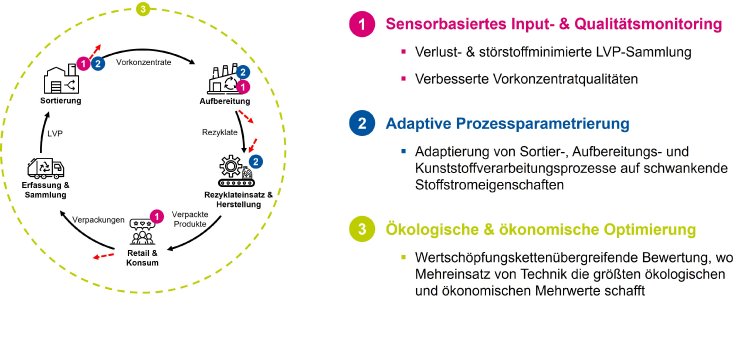The BMBF-funded research project ReVise-UP ("Improving the process efficiency of mechanical recycling of post-consumer plastic packaging waste through intelligent material flow management - implementation phase") was launched in September 2023. The four-year implementation phase will increase the transparency and efficiency of mechanical plastics recycling by developing and demonstrating sensor-based material flow characterization methods on an industrial scale.
Sensor data creates data transparency
Based on the data transparency generated by sensor data, the current plastics recycling process will be improved through three effects: First, data transparency should create positive incentives for improved collection and product quality, resulting in increased recyclate volumes and qualities. Second, sensor-based material flow characteristics will be used to adapt sorting, treatment and plastics processing processes to fluctuating material flow characteristics. Thirdly, the improved data situation should enable a holistic ecological and economic assessment of the value chain.
SKZ has expertise in plastics and recycling
"We are proud to be able to contribute to this important topic with our expertise in the field of plastic materials and recycling," says Johannes Rudloff, Head of Materials, Compounding and Extrusion at SKZ Plastics Center.
A total of 18 project participants
A total of 18 research institutes, associations and industrial partners are involved in ReVise-UP. The German Federal Ministry of Education and Research (BMBF) is funding ReVise-UP with €3.92 million as part of the "Resource-efficient recycling management - plastics recycling technologies (KuRT)" funding guideline.
The SKZ is a member of the Zuse Association. This is an association of independent, industry-related research institutions that pursue the goal of improving the performance and competitiveness of industry, especially SMEs, through innovation and networking.
Learn more about ReVise-Up
Learn more about SKZ Material, Compounding and Extrusion development


